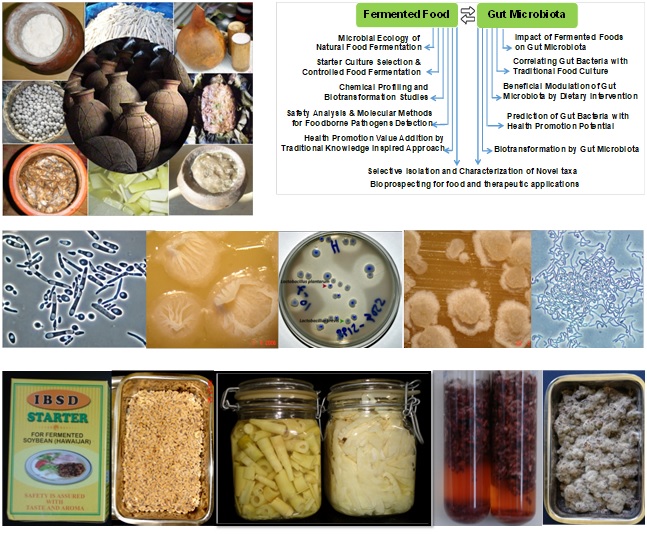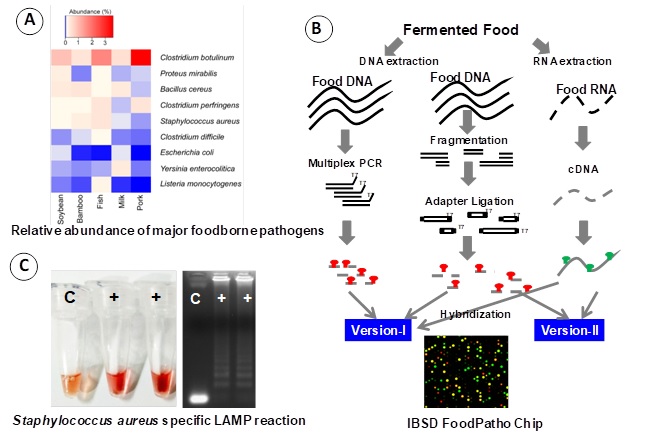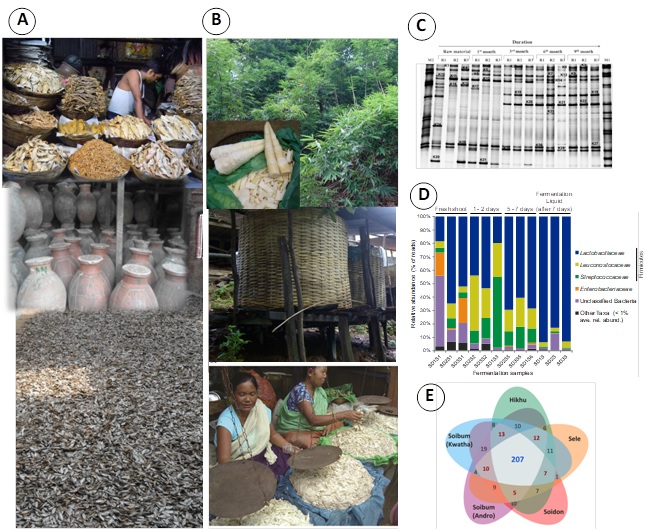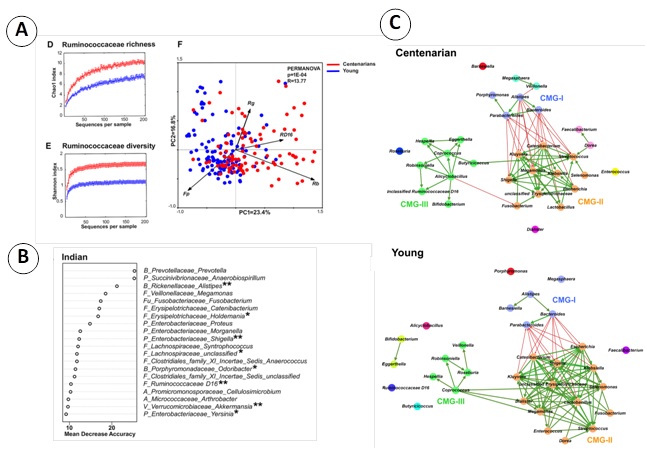
Kumaraswamy Jeyaram
Kumaraswamy Jeyaram, PhD
Designation/Position: Scientist-F
Department/Programme Name: Microbial Resources
Phone: 0385-2446122, Ext:212 (Imphal)
0389-2335333 (Aizawl)
Academic Qualifications
• 2012-2013, Post-Doctoral, Laboratory of Microbiology, Wageningen University, The Netherlands.
• 1999-2003, PhD (Biotechnology), Tamil Nadu Agricultural University, Coimbatore
• 1997-1999, M.Sc (Agri) in Agricultural Microbiology, Tamil Nadu Agricultural University
Experience
• 2013-2019, Scientist-D, Institute of Bioresources and Sustainable Development, Imphal, India
• 2008-2013, Scientist-C, Institute of Bioresources and Sustainable Development, Imphal, India
• 2003-2008, Scientist-B, Institute of Bioresources and Sustainable Development, Imphal, India
Awards & Fellowships
• 2011: DBT-CREST award for postdoctoral study, Department of Biotechnology, Govt. of India
• 2007: DST-IIPA Silver Medal, for the performance during Foundation Training Programme for Scientists and Technologists, Indian Institute of Public Administration (IIPA), New Delhi & Department of Science and Technology (DST), Govt. of India
• 2003: Dr. S. K. Ballal award for the best student in Biotechnology during PhD research, Tamil Nadu Agricultural University (TNAU), India
• 2003: Dr. Gurudev S. Khush award for the best student in Biotechnology during PhD research, TNAU, India
Memberships (Professional Associations / Societies)
• Life Member of Biotech Research Society of India (BRSI), India
• Life Member of Probiotic Association of India (PAi), India
PhD’s Guided
• Thangjam Anand Singh, 2015, Fibrinolytic enzymes in traditional fermented foods of Northeast India and associated microorganisms, Gauhati University
• Wahengbam Romi,2016, Metagenomic and culture-dependent analysis of microbial communities associated with natural fermentation of different indigenous bamboo shoot products of Northeast India, Gauhati University
• K. Romapati Devi, 2016, Molecular approaches to study the microbial communities associated with a fermented fish product of Manipur-Ngari and their functionality, Gauhati University
• Santosh Keisam, 2018, Culture-independent molecular assessment of microbial risk associated with traditional fermented foods of Northeast India, Gauhati University
• Ngangyola Tuikhar, 2019, Gut microbiota signatures of longevity and potential health-promoting bacteria from healthy centenarians of Manipur, Gauhati University (Submitted)
Specialized Training
• Molecular identification of wine yeasts, University of Basilicata, Italy.
• Human intestinal tract chip (HITChip) for human gut microbial ecology studies, Wageningen University, The Netherlands.
• Exposure visit to Universities/ Institutes/ Science Parks in Taiwan sponsored by Dept. of Science and Technology, Govt. of India.
• Anaerobic microbiology techniques, Wageningen University, The Netherlands.
• GelCompar II and BioNumerics Statistical softwares, Applied Maths, Ghent, Belgium.
• Canoco software and R packages for microbial ecology studies, Wageningen University, The Netherlands
Other Achievements
• Hosted two DBT-TWAS fellowship students from Nigeria for doctoral research and two Researchers from Côte d’Ivoire and Benin for postdoctoral research.
1. Research theme photo

2. Verticals involved
Fermented Foods and Value Addition
3. Research Area/Research Expertise
· Traditional fermented foods and fermented medicines of Northeast India.
· Microbial ecology dynamics and metabolite profile changes during natural food fermentation.
· Starter culture consortium & processes for safe, quality and healthy fermented food products.
· Fermented foods as medicine through traditional knowledge inspired validation approach.
· Impact of consuming fermented foods and fermenting microbiota on human gut microbiota.
· Fermented foodborne pathogens, molecular diagnosis and risk assessment platforms.
· Probiotics, prebiotics and functional bioingredients.
4. Research Summary
A. Current Research:
A.1. Transformation of high-risk traditional fermented foods production to a safer starter-culture based controlled fermentation products with value addition
Frequent incidence of fermented foodborne outbreaks/ food poisoning is reported in Northeastern states of India. Moreover, our cultivation-independent molecular studies showed an unusual predominance of Clostridium spp. in the fermented fish, soybean and pork products. We are studying the fermented fish products ((ngari, tungtap, shedal, elisa ngari, lona iilish, hentak) of Northeast India and five unique fermented foods of Mizoram namely bekang-um (fermented soybean), sa-um (fermented pork fat), tam-um (fermented mustard leaves), ngapi (fermented fish paste), dang-pui-thu (fermented shrimp paste), ai-um (fermented crab), ngawum (fermented small dry fish), rep (fermented bamboo shoot), and thingrung (fermented rai/ mustard seed). Development of starter culture consortium and optimised controlled fermentation process along with value-addition expected from this study. Also, we plan to adopt the traditional fermented producers from Manipur and Mizoram to promote entrepreneurship for the scientific production of fermented foods to improve the safety of the marketed fermented food products.

A.2. Developing molecular diagnosis platforms for assessing the microbial risk in the naturally fermented foods (IBSD FoodPathoChip &LAMP-based diagnostic kit)
We compared the microbial community structure of the outbreak samples of fermented food with the non-outbreak samples. The overall microbial community structure of the outbreak fermented food samples was entirely different from the non-outbreak samples, suggested the importance of assessing the overall microbial community structure as a parameter while assessing the microbial risk of the naturally fermented foods. We have designed two versions of IBSD FoodPatho Chip (a microarray-based molecular analysis platform, DBT funded an extramural project) for assessing the microbial risk of naturally fermented foods. The Version-I contained 14,513 probes targeting 16S rRNA gene of foodborne pathogens (WHO list and Robert Koch Institute list) and food fermenting bacteria (from in-house analysis), to assess the overall bacterial community structure of the fermented food. The version–II contained 15,897 probes targeting strain typing of WHO listed foodborne pathogens, bacterial toxins and virulence factors, and genes associated with antibiotic resistance and biogenic amine production, to assess the risk of foodborne pathogens present in the fermented foods. It was designed to differentiate the viable (RNA level analysis) and total (DNA level analysis) foodborne pathogens and semi-quantification of the load. In parallel, we are designing a LAMP (Loop-mediated isothermal amplification)-based diagnostic kit for field-level detection of 16 foodborne pathogens (through ICMR funded extramural project). We are checking the specificity and cross-reaction of the LAMP primers by using the genomic DNA from the type strains of the pathogens and other food fermenting bacteria of our collection. A simplified version of LAMP reaction-based diagnostic kit with colour development in the endpoint as positivity is planned at the end of the project.

Figure: Molecular analysis platforms for assessing the microbial risk in naturally fermented foods
A. The heat map shows the relative abundance of the major foodborne pathogens detected in the fermented foods of Northeast India
B. The flow chart shows the IBSD FoodPatho Chip-based analysis platform designed for the fast and reliable assessment of microbial risk in the traditional fermented foods
C. LAMP-based detection kit for fermented foodborne pathogens detection
A.3. Understanding the diversity and functionality of small double-stranded RNA (dsRNA) produced by food fermenting bacteria
The mechanism of human health promotion by the ingested bacteria through fermented food is not yet been fully elucidated. We have investigated the small double-stranded RNA (dsRNA) produced by the common food fermenting bacteria (belong to the genera Lactobacillus, Lactococcus, Tetragenococcus, Leuconostoc, Weissella, and Bacillus). Selective extraction of small dsRNA and sequencing of the dsRNA fraction by Illumina platform generated tens of thousands of extremely diverse unique dsRNA sequences with a length of 18-51 bases. These highly diverse dsRNA sequences were analysed for its target on human transcriptome by bioinformatics approaches using National PARAM Supercomputing Facility (NPSF). The predicted anti-HIV activity of dsRNA fraction has been successfully validated in HIV infected cell line model in collaboration with Dr Vainav Patel, NIRRH (ICMR). Validation of the predicted anti-inflammatory and anti-cell proliferation potential of the bacterial dsRNA fractions through high content imaging assays in cell line models is in progress with the support of C-CAMP, HCS facility. Uncovering the structure and biological function of these diverse dsRNAs may lead to the development of novel RNA therapy.

Figure. Characterisation of the small dsRNA produced by food fermenting lactic acid bacteria
B. Previous Notable Research:
B.1. Studied the microbial ecology of natural bamboo shoot and fish fermentation
In our earlier studies, we used cultivation-independent molecular methods such as PCR-DGGE and Illumina MiSeq amplicon sequencing by targeting the bacterial 16S rRNA gene and fungal ITS region for the in-depth microbial community analysis of naturally fermented fish and bamboo shoot products. The bacterial dynamics during year-long spontaneous Ngari fermentation (a fermented fish of Manipur) was analysed from two main Ngari production centres of Manipur (Singjamei and Sekmai, which are having a pedigree record of good quality ngari production). Similarly, the time-series samples (over a duration up to 258 days) collected from four different indigenous fermented bamboo shoot products (soibum, soidon, sele, hikhu) were analyzed by MiSeq amplicon sequencing and established a multi-phase succession of autochthonous lactic acid bacteria to reach a stable ecosystem during natural bamboo shoot fermentation. The biochemical changes during fermentation were also determined through metabolite profiling by liquid chromatography-high resolution mass spectrometry (LC-HRMS). Besides, we have analysed the microbial community structure present in 54 different types of naturally fermented foods marketed in Northeast India.

Figure. Microbial dynamics during natural fish and bamboo shoot fermentation
A, B Indigenous preparation of fermented fish product and bamboo shoot products
C. PCR-DGGE analysis shows the bacterial dynamics during Ngari fermentation
D. Illumina MiSeq amplicon sequencing reveals the relative abundance changes in lactic acid bacteria during Soidon fermentation. E. Venn diagram shows the variation in core microbiota among different bamboo shoot products
B.2. Developed starter culture consortium and controlled fermentation process for safe, quality and healthy products
Based on the culture-independent molecular ecology studies, we have selectively isolated the predominant microbes involved in the natural food fermentation, designed the starter culture consortium with desirable fermentative and functional properties. The isolates were screened for technological features such as probiotic potentials, antimicrobial activity against common foodborne pathogens and exopolysaccharides production. We have designed starter culture consortium for Hawaijar (fermented soybean), Soibum & Soidon (fermented bamboo shoot), Ngari (fermented fish) and Athingba (rice wine). And, succeeded the controlled fermentation process for the production of Hawaijar (within 8 hours against 3-5 days in traditional fermentation) and Soibum (15-20 days against 6-12 month in the conventional fermentation) with desirable sensory properties. In the case of soybean fermentation, we demonstrated an increase in the antioxidant activity and fibrinolytic activity due to the selected starter culture Bacillus subtilis MTCC 5480. Also, we analysed the biochemical changes during starter culture-based controlled fermentation by LC-HRMS and compared the changes with the traditional production.

Figure. Selection of starter culture consortium by screening the dominant microbial cultures for fermentative and functional properties. A. Fibrinolytic activity, Extracellular polysaccharides production, C. Biogenic amine production, D. Antimicrobial activity against foodborne pathogens
B.3. Assessed the safety of the naturally fermented foods marketed in Northeast India
The microbial risk involved with natural food fermentation is mostly unknown. We have analysed 682 samples of 39 food types (broadly categorized into fermented soybean, bamboo shoot, fish and pork products) collected over four different seasons from seven states of India by cultivation-independent MiSeq amplicon sequencing. Among the WHO prioritized foodborne bacterial pathogens, we detected the prevalence of bacterial phylotypes related to Clostridium botulinum, Bacillus cereus, Staphylococcus aureus, Clostridium perfringens, Listeria monocytogenes, and Escherichia coli in these ethnic foods. Unlike other naturally fermented foods reported worldwide, Clostridium spp. (mainly a phylotype related to C. botulinum) and Proteus spp. (particularly Proteus mirabilis) were predominantly present in the fermented foods of Northeast India. Pathogen-specific qPCR assays confirmed a higher population (>107 cells/g) of B. cereus, P. mirabilis, and a C. botulinum related phylotype in the fermented soybean, fish, and pork products. All the soybean samples and the isolated B. cereus cultures were positive for diarrheal toxins, and nearly half of the samples were positive for emetic toxin (cereulide). However, we could not confirm the presence of botulinum neurotoxin (toxins A, B, E, and F) in the C. botulinum positive food samples. This is the first baseline data of the enteric bacterial pathogens prevalent in the traditional fermented foods of India. Our study emphasizes the need of the hour to have a coordinated action to control and prevent the spread of enteric bacterial pathogens through fermented foods marketed in India. Moreover, replacing the indigenous process with a defined starter culture-based controlled fermentation will enhance the safety of Indian fermented foods.
B.4. Studied the impact of fermented foods consumption on human gut microbiota and identified gut microbiota signatures of longevity
In our study on the impact of fermented foods consumption on human gut microbiota (by using human intestinal tract chip - HITChip in collaboration with Prof. Hauke Smidt, Laboratory of Microbiology, Wageningen University, The Netherlands), we observed a bimodal distribution of gut microbiota structure in the Indian study population (Manipuri community, Manipur) and their seasonal instability in the fermented food consumers. Moreover, we identified some regions in the Manipur state of India with high centenarian prevalence. We analyzed the gut microbiota and faecal metabolites composition of centenarians (~100 years) in comparison to young adults (25-45 years) from the region with high centenarian prevalence (Naga community), as well as to young adults from the nearby region with low centenarian prevalence (Meitei community). Gut microbiota composition was studied by Illumina MiSeq sequencing of the 16S rRNA gene and taxa-specific qPCR assays. The faecal metabolites were analyzed by liquid chromatography–high-resolution mass spectrometry (LC–HRMS). We compared the results with the gut microbiota data available publicly from three countries (Italy, Japan, and China) of similar groups including 125 centenarians (collaboration with Dr Elena Biagi, Department of Pharmacy and Biotechnology, University of Bologna, Italy). We observed bacterial signatures that are common among extremely older people of a different nationality. Our results support to develop a gut microbiota based biomarkers to identify healthy ageing in the elderly population. Also, identified gut bacterial resources with potential application in healthy ageing and increasing human longevity. 
Scopus Author ID: 24178937400; ORCID ID: orcid.org/0000-0003-4494-3185
A. Research Articles
1. Djeni TN, Kouame KH, Ake FDM, Amoikon LST, Dje MK, Jeyaram K (2020) Microbial diversity and metabolite profiles of palm wine produced from three different palm tree species in Côte d’Ivoire. Scientific Reports.10(1):1715. Impact factor: 4.525, PubMedID:32015447. doi: 10.1038/s41598-020-58587-2.
2. Keisam S, Tuikhar N, Ahmed G, Jeyaram K (2019) Toxigenic and pathogenic potential of enteric bacterial pathogens prevalent in the traditional fermented foods marketed in the Northeast region of India. International Journal of Food Microbiology.296:21-30. Impact factor: 4.386, PubMedID: 30826539. doi:10.1016/j.ijfoodmicro.2019.02.012.
3. Tuikhar N, Keisam S, Labala RK, Imrat, Ramakrishnan P, Arunkumar MC, Ahmed G, Biagi E, Jeyaram K (2019) Comparative analysis of the gut microbiota in centenarians and young adults shows a common signature across genotypically non-related populations. Mechanisms of Ageing and Development. 179:23-35. Impact factor: 3.906. PubMedID: 30738080. doi: 10.1016/j.mad.2019.02.001.
4. Sessou P, Keisam S, Tuikhar N, Gagara M, Farougou S, Jeyaram K (2019) High-Throughput Illumina MiSeq Amplicon Sequencing of Yeast Communities Associated With Indigenous Dairy Products From Republics of Benin and Niger. Frontiers in Microbiology. 10:594. Impact factor: 4.259. PubMedID: 31001212. doi:10.3389/fmicb.2019.00594.
5. Adesulu-Dahunsi AT, Sanni AI, Jeyaram K, Ojediran JO, Ogunsakin AO, Banwo K. (2018) Extracellular polysaccharide from Weissella confusa OF126: Production, optimization, and characterization. International Journal of Biological Macromolecules. 111:514-525. Impact factor: 4.731. PubMedID: 29337101.doi:10.1016/j.ijbiomac.2018.01.060.
6. Adesulu-Dahunsi AT, Sanni AI, Jeyaram K (2018) Production, characterization and In vitro antioxidant activities of exopolysaccharide from Weissella cibaria GA44. LWT - Food Science and Technology. 87: 432-442. Impact factor: 4.000. Article Link: https://doi.org/10.1016/j.lwt.2017.09.013.
7. Shangpliang HNJ, Rai R, Keisam S, Jeyaram K, Tamang JP (2018) Bacterial community in naturally fermented milk products of Arunachal Pradesh and Sikkim of India analysed by high-throughput amplicon sequencing. Scientific Reports. 8(1):1532. Impact factor: 4.525, PubMedID: 29367606. doi: 10.1038/s41598-018-19524-6.
8. Adesulu-Dahunsi AT, Jeyaram K, Sanni AI, Banwo K (2018) Production of exopolysaccharide by strains of Lactobacillus plantarum YO175 and OF101 isolated from traditional fermented cereal beverage. PeerJ. 6:e5326. Impact factor: 2.35. PubMedID: 30324007. doi:10.7717/peerj.5326.
9. Adesulu-Dahunsi AT, Jeyaram K, Sanni AI (2018) Probiotic and technological properties of exopolysaccharide producing lactic acid bacteria isolated from cereal-based nigerian fermented food products. Food Control. 92:225-31. Impact factor: 4.391. Article Link: https://doi.org/10.1016/j.foodcont.2018.04.062
10. Adesulu-Dahunsi AT, Sanni AI, Jeyaram K, Banwo K (2017) Genetic diversity of Lactobacillus plantarum strains from some indigenous fermented foods in Nigeria. LWT - Food Science and Technology. 82: 199-206. Impact factor: 4.000. Article Link: https://doi:10.1016/j.lwt.2017.04.055
11. Adesulu-Dahunsi AT, Sanni AI, Jeyaram K (2017) Rapid differentiation among Lactobacillus, Pediococcus and Weissella species from some Nigerian indigenous fermented foods. LWT - Food Science and Technology.77: 39-44. Impact factor: 4.000. Article Link: https://doi:10.1016/j.lwt.2016.11.007
12. Keisam S, Romi W, Ahmed G, Jeyaram K (2016) Quantifying the biases in metagenome mining for realistic assessment of microbial ecology of naturally fermented foods. Scientific Reports. 6:34155. Impact factor: 4.525. PubMedID: 27669673. doi:10.1038/srep34155
13. Romi W, Ahmed G, Jeyaram K (2015) Three-phase succession of autochthonous lactic acid bacteria to reach a stable ecosystem within 7 days of natural bamboo shoot fermentation as revealed by different molecular approaches. Molecular Ecology. 24(13):3372-89. Impact factor: 5.855. PubMedID: 25963776. doi: 10.1111/mec.13237.
14. Devi KR, Deka M, Jeyaram K (2015) Bacterial dynamics during yearlong spontaneous fermentation for production of ngari, a dry fermented fish product of Northeast India. International Journal of Food Microbiology. 199:62-71. Impact factor: 4.386. PubMedID: 25637876. doi:10.1016/j.ijfoodmicro.2015.01.004
15. Sanjukta S, Rai AK, Muhammed A, Jeyaram K, Talukdar NC (2015) Enhancement of antioxidant properties of two soybean varieties of Sikkim Himalayan region by proteolytic Bacillus subtilis fermentation. Journal of Functional Foods. 14: 650-658. Impact factor: 3.833. Article Link: https://doi.org/10.1016/j.jff.2015.02.033
16. Romi W, Keisam S, Ahmed G, Jeyaram K (2014) Reliable differentiation of Meyerozyma guilliermondii from Meyerozyma caribbica by internal transcribed spacer restriction fingerprinting. BMC Microbiology. 14:52. Impact factor: 3.372, PubMedID: 24575831. doi:10.1186/1471-2180-14-52
17. Singh TA, Devi KR, Ahmed G, Jeyaram K (2013) Microbial and endogenous origin of fibrinolytic activity in traditional fermented foods of Northeast India. Food Research International. 55:356-362. Impact factor: 3.579, Article Link: https://doi.org/10.1016/j.foodres.2013.11.028
18. Adewumi GA, Oguntoyinbo FA, Keisam S, Romi W, Jeyaram K (2013) Combination of culturf-ndependent and culture-dependent molecular methods for the determination of bacterial community of iru, a fermented Parkia biglobosa seeds. Frontiers in Microbiology. 3:436. Impact factor: 4.259, PubMedID: 23316189. doi:10.3389/fmicb.2012.00436
19. Jeyaram K, Romi W, Singh TA, Adewumi GA, Basanti K, Oguntoyinbo FA (2011) Distinct differentiation of closely related species of Bacillus subtilis group with industrial importance. Journal of Microbiological Methods. 87(2):161-4. Impact factor: 1.803, PubMedID: 21889958. doi:10.1016/j.mimet.2011.08.011.
20. Jeyaram K, Tamang JP, Capece A, Romano P (2011) Geographical markers for Saccharomyces cerevisiae strains with similar technological origins domesticated for rice-based ethnic fermented beverages production in North East India. Antonie van Leeuwenhoek, International Journal of General and Molecular Microbiology. 100(4):569-78. Impact factor: 1.879, PubMedID: 21717205. doi:10.1007/s10482-011-9612-z
21. Jeyaram K, Romi W, Singh TA, Devi AR, Devi SS (2010) Bacterial species associated with traditional starter cultures used for fermented bamboo shoot production in Manipur state of India. International Journal of Food Microbiology. 143(1-2):1-8. Impact factor: 4.386, PubMedID: 20696489. doi:10.1016/j.ijfoodmicro.2010.07.008
22. Jeyaram K, Singh TA, Romi W, Devi AR, Singh WM (2009) Traditional fermented foods of Manipur. Indian Journal of Traditional Knowledge. 8(1): 115-121. Article Link: http://nopr.niscair.res.in/handle/123456789/2982
B. Review Articles
1. Rai AK, Sanjukta S, Jeyaram K (2017) Production of angiotensin I converting enzyme inhibitory (ACE-I) peptides during milk fermentation and their role in reducing hypertension. Critical Reviews in Food Science and Nutrition. 57(13):2789-2800. Impact factor: 6.704. PubMedID: 26463100. doi:10.1080/10408398.2015.1068736
C. Book Chapters
1. Wahengbam, R., Thangjam, A. S., Keisam, S., Asem, I. D., Ningthoujam, D. S., Jeyaram, K. (2020). Ethnic Fermented Foods and Alcoholic Beverages of Manipur. Book of Ethnic Fermented Foods and Beverages of India: Science History and Culture. Springer, 349-419. https://doi.org/10.1007/978-981-15-1486-9_14
2. Rai AK, Jeyaram K (2017) Legume-based food fermentation: Biochemical aspects. In: Fermented Foods: Part II: Technological Interventions.CRC Press. doi:10.1201/9781315205359
3. Rai, A. K., & Jeyaram, K. (2017). Role of yeasts in food fermentation. Book of Yeast Diversity in Human Welfare. Springer, 83-113. https://doi.org/10.1007/978-981-10-2621-8_4
4. Sourabh, A., Rai, A. K., Chauhan, A., Jeyaram, K., Taweechotipatr, M., Panesar, P. S., … Kumar, V. (2016). Health-related issues and indigenous fermented products. Book of Indigenous Fermented Foods of South Asia, CRC Press, 309-352
5. Rai AK, Jeyaram K (2015) Health benefits of functional proteins in fermented foods. Book of Health Benefits of Fermented Foods and Beverages. CRC Press, 44: 455-474. doi:10.1201/b18279
|
1. |
Mr Imrat, Senior Research Fellow, ICMR project Email: imratsbt999@gmail.com Project title: Quantifying the microbial risk in protein-rich fermented foods of Manipur to identify the critical control points and development of LAMP-based rapid diagnosis kit for major foodborne pathogens Expected Outcome: LAMP-based rapid diagnosis kit for major foodborne pathogens |
|
|
2. |
Mrs. Thangjam Kanchal Devi, PhD scholar, IBSD Core Email: kanchaltodd@gmail.com Problem addressing: Fermented fish product of Manipur Expected Outcome: Starter culture consortium for Ngari |
|
|
3. |
Ms. C. Lalkroschhuangi, IBSD Core Email: krosofficial1@gmail.com Problem addressing: Fermented foods of Mizoram Expected Outcome: Documentation of indigenous traditional knowledge |
|
|
4. |
Mr. Ningthoujam Herojit Singh, IBSD Core Lab Attendant
|
|
|
Previous Members (Alumni) |
||
|
1. 1. |
Dr. Thangjam Anand Singh Email anan_thangjam@yahoo.co.in Worked on: Fibrinolytic enzymes in traditional fermented foods of Northeast India Currently working as ICAR Scientist at Central Agricultural University, Imphal |
|
|
2. |
Dr. Wahengbam Romi Email: romiwahengbam@gmail.com Worked on: Fermented bamboo shoot products of Northeast India Currently working as Scientist at CSIR-NEIST, Jorhat |
|
|
3. |
Dr. Khunjamayum Romapati Devi E-mail: waikhomromapati@yahoo.com Mobile: 08415044394 Worked on: Fermented fish product -Ngari Currently working at: N/A |
|
|
4. |
Mr. Santosh Keisam, Email: santosh.keisam@gmail.com Worked on: Microbial risk assessment of fermented foods Currently working as Research Associate at Modern College, Imphal |
|
|
5. |
Ms Ngangyola Tuikhar, IBSD Core Email: ngangyola@gmail.com Worked on: Gut microbiota of Indian centenarians Currently working at: N/A |
|
|
6. |
Dr Sessou Philippe Email: sessouphilippe@yahoo.fr Worked on: Microbial diversity of traditional Cheese of Benin Currently working as Associate Professor University of Abomey-Calavi (UAC), Republic of Benin.
|
|
|
7. |
Dr. Theodore N. DJENI Email: tdjeni@yahoo.fr Worked on: Microbial diversity of palm wines in Côte d’Ivoire Currently working as Associate Professor at University Nangui Abrogoua, COTE D’IVOIRE |
|
|
8. |
Dr. Adesulu Adekemi Titilayo (2014-2015) Email: adesuluchemmy@yahoo.com Current position: Researcher, Landmark University, Nigeria |
|
|
9 |
Dr. Gbenga Adedeji Adewumi Email: gadewumi@unilag.edu.ng Current position: Lecturer and Researcher; University of Lagos, Nigeria.
|
|
|
A. Core/Internal a. Present: |
|||||||||||||
|
Sl. No. |
Duration (From-To) |
Title of Project/ Grant |
PI/Co-PI |
Funding Agency |
|
||||||||
|
1. |
2014-2020 |
Diversity and functionality of non-coding dsRNA produced by food fermenting lactic acid bacteria (Ph.D student: Mr. Imrat) |
PhD research supervisor
|
IBSD & DBT-JRF |
- |
||||||||
|
2. |
2018-2022 |
Development of bacterial starter culture consortium for a controlled Ngari fermentation, analyses of biotransformation and impact on human gut microbiota to establish the health benefits (Ph.D student: Mrs. Thangjam Kanchal Devi) |
PhD research supervisor
|
IBSD & CSIR-JRF
|
- |
||||||||
|
|
|||||||||||||
|
b. Past: |
|||||||||||||
|
Sl. No. |
Duration (From-To) |
Title of Project/ Grant |
PI/Co-PI |
Funding Agency |
|
||||||||
|
1. |
2009-2014 |
Molecular approaches to study the microbial communities associated with fermented fish product of Manipur-Ngari and their functionality (Ph.D student: K. Romapati Devi) |
PhD research supervisor
|
IBSD |
- |
||||||||
|
1. |
2010-2014 |
Fibrinolytic enzymes in traditional fermented foods of Northeast India and associated microorganisms (Ph.D student: T. Anand Singh) |
PhD research supervisor
|
IBSD |
- |
||||||||
|
2. |
2010-2014 |
Metagenomic and culture-dependent analysis of microbial communities associated with natural fermentation of different indigenous bamboo shoot products of Northeast India (Ph.D student: W. Romi) |
PhD research supervisor
|
IBSD & CSIR-SRF |
- |
||||||||
|
3. |
2011-2015 |
Culture-independent molecular assessment of microbial risk associated with traditional fermented foods of Northeast India (Ph.D student: Santosh Keisam) |
PhD research supervisor
|
IBSD & UGC-JRF |
- |
||||||||
|
4. |
2013-2019 |
Gut microbiota signatures of longevity and potential health-promoting bacteria from healthy centenarians of Manipur (Ph.D student: Ngangyola Tuikhar) |
PhD research supervisor
|
IBSD & UGC-JRF |
- |
||||||||
|
|
|||||||||||||
|
B. Extramural: a. Present: |
|||||||||||||
|
Sl. No. |
Duration (From-To) |
Title of Project/ Grant |
PI/Co-PI |
Funding Agency |
|
||||||||
|
1. |
2017-2020 |
Quantifying the microbial risk in protein-rich fermented foods of Manipur to identify the critical control points and development of LAMP-based rapid diagnosis kit for major foodborne pathogens |
PI |
Indian Council of Medical Research (ICMR), Govt. of India |
|
||||||||
|
|
|||||||||||||
|
b. Past: |
|||||||||||||
|
Sl. No. |
Duration (From-To) |
Title of Project/ Grant |
PI/Co-PI |
Funding Agency |
|
||||||||
|
1. |
2006 -2010
|
Molecular identification and technological characterization of wine yeasts associated with Hamei- a traditional starter used for rice wine production in Manipur, India (DST/INT/ITALY/POC(2005-07)) |
PI (Italian Collaborator: Prof. Patrizia Romano, University of Basilicata, Potenza, Italy) |
Indo-Italian collaborative project, DST, Govt. of India |
Travel grant |
||||||||
|
2. |
2007 -2011
|
Production technology for quality Soibum and its value addition (BT/PR-9268/FNS/20/342/2007)
|
PI Networking Institutions: 1. Dr. T.C. Bora, North-East Institute of Science and Technology (NEIST), Jorhat, Assam 2. Prof. J. P. Tamang, Sikkim Govt. College, Gangtok. 3. Prof. N. Rajmuhon Singh, Manipur University, Manipur. |
Dept. of Biotechnology, Govt. of India. |
|
||||||||
|
3. |
2007 -2010
|
Screening, purification and characterization of fibrinolytic enzymes from Bacillus resources originated from fermented soybean-Hawaijar (BT/PR8943/GBD/27/45/2006) |
PI |
Dept. of Biotechnology, Govt. of India. |
|
||||||||
|
4. |
2011 -2013
|
Molecular analysis of gut microbiome composition changes due to regular consumption of traditional fermented foods (BT/IN/CREST-Awards/44/KJ/2010-11) |
PI
Collaborator: Prof. Hauke Smidt, Laboratory of Microbiology, Wageningen University, The Netherlands.
|
DBT-CREST-Award for the year 2010-2011 & IBSD |
|
||||||||
|
5. |
2016-2019 |
Development and application of DNAChip based analysis platform for assessment of microbial risk associated with traditional fermented foods of Northeast India (BT/PR10492/PFN/20/858/2013) |
PI |
Dept. of Biotechnology, Govt. of India. |
|
||||||||
|
|
|||||||||||||
|
Host for foreign researchers
|
|||||||||||||
|
Sl. No. |
Duration (From-To) |
Title of Project/ Grant |
PI/Co-PI |
Funding Agency |
|||||||||
|
1. |
2010-2011 |
Molecular characterization and probiotic potentials of Bacillus species isolated from African food condiments (FR3240223448)
|
Research Host for PhD student: Gbenga Adedeji Adewumi, Affiliation: Department of Microbiology, University of Lagos, Nigeria |
DBT-TWAS Sandwich Postgraduate Fellowship 2010 |
- |
||||||||
|
2. |
2014-2015 |
Genomic and technological characterization of Leuconostoc species isolated from some traditional cereal-based fermented foods, dairy and vegetable products in Nigeria (FR number: 3240274984)
|
Research Host for PhD student: Adekemi Titilayo Adesulu Affiliation: Department of Microbiology, University of Ibadan, Nigeria |
DBT-TWAS Sandwich Postgraduate Fellowship 2013 |
- |
||||||||
|
3. |
March-August 2017 (6 months) |
Evaluation of lactic acid bacteria and yeast communities involved in the indigenous fermentation of palm trees saps in Côte d’Ivoire for selecting suitable starter/probiotic cultures |
Research host for Dr. N’Dede Theodore Djeni, Associate Professor, University Nangui, Côte d’Ivoire |
C.V. Raman International Fellowship, DST, Govt. of India |
|
||||||||
|
4. |
March – September 2017 (6 months) |
Molecular identification and technological characterisation of yeast and lactic acid bacteria associated with Wagashi- a traditional cheese of Benin |
Dr Sessou Philippe, Assistant Professor, University of Abomey Calavi (UAC), Benin |
RTF-DCS fellowship, NAM S&T Centre |
|
||||||||
